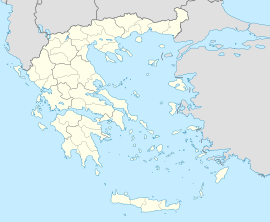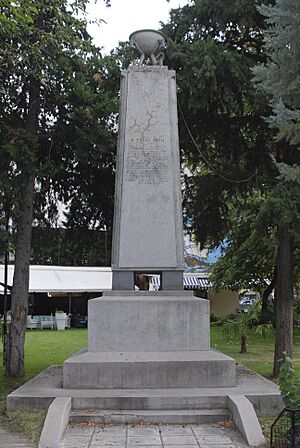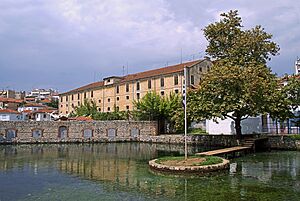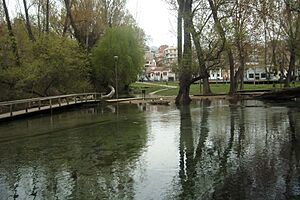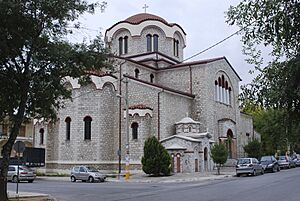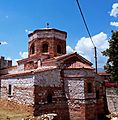Drama, Greece facts for kids
Quick facts for kids
Drama
Δράμα
|
|
|---|---|
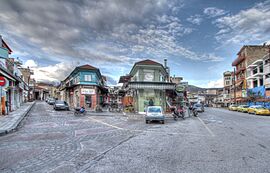 |
|
| Country | Greece |
| Administrative region | Eastern Macedonia and Thrace |
| Regional unit | Drama |
| Area | |
| • Municipality | 840.1 km2 (324.4 sq mi) |
| • Municipal unit | 488.8 km2 (188.7 sq mi) |
| Elevation | 115 m (377 ft) |
| Population
(2021)
|
|
| • Municipality | 55,679 |
| • Municipality density | 66.277/km2 (171.656/sq mi) |
| • Municipal unit | 55,440 |
| • Municipal unit density | 113.421/km2 (293.76/sq mi) |
| Community | |
| • Population | 44,257 (2021) |
| Time zone | UTC+2 (EET) |
| • Summer (DST) | UTC+3 (EEST) |
| Postal code |
661 00
|
| Area code(s) | 2521 |
| Vehicle registration | ΡΜ |
Drama (Greek: Δράμα, romanized: Dráma) is a city and a municipality in Macedonia, northeastern Greece. It is the main city of the regional unit of Drama, which is part of the East Macedonia and Thrace region.
The city of Drama is home to about 44,257 people (as of 2021). It is the economic heart of its municipality, which has a total population of 55,679. This means the municipality of Drama holds about 60 percent of all the people in the wider Drama region. Other important communities in the municipality include Xiropótamos, Choristi, Kallífytos, Kalós Agrós, and Koudoúnia.
Drama is built at the foot of Falakro mountain. It is a green area with lots of water. Drama has been a part of the Greek world since ancient times. During the Byzantine Empire, it was a strong city with a castle. It became very important for trade and military under the Komnenoi rulers.
Later, during the Ottoman period, growing and trading tobacco became very important. The railway, built in 1895, and better roads to the port of Kavala helped the city grow. More people moved there, and businesses became stronger.
Today, Drama hosts fun events. The "Eleftheria" cultural events happen in late June or early July. They celebrate the city's freedom. There is also an annual film festival in September.
Contents
What's in a Name?
Archaeologists have found signs that an ancient Greek settlement was here. It was called Dyrama or Hydrama. Both names mean "rich in water" in Greek. This makes sense because of all the water sources in the area!
Some experts think Drama might be linked to an ancient Greek place called Drabescus. Hydrama was known as a place where many gods from Greek mythology were worshipped. These included Apollo and Artemis. Over time, Dyrama became the name we know today: Drama. In South Slavic languages, the city is called Драма, which is just how they say the Greek name.
A Look Back in Time
The ancient Greeks knew this city as Hydrama or Dyrama. This was because of its many water sources. Later, it was known as Drabescus. It became part of the Roman and Byzantine Empires, just like the rest of Greece.
Ottoman Rule
The Ottoman Empire took control of the region in 1371. By 1519, the town had a mix of Muslim and Christian families. It was part of the area ruled by the beylerbey of Rumelia. In the 1800s, Drama became the center of the Sanjak of Drama.
In 1912, during the First Balkan War, Bulgarian troops took Drama from the Ottomans. But in 1913, after the Second Balkan War and the Treaty of Bucharest, Drama became part of Greece. This happened along with the rest of eastern Macedonia.
World War II and After
During World War II, German troops invaded Greece in 1941. After this, Bulgarian troops occupied Drama from 1941 to 1944.
On September 28, 1941, local people organized a series of attacks against the occupying forces. This happened in Drama and nearby villages. In response, the Bulgarian forces acted very harshly. Many people were killed in Drama, Doxato, and other villages like Choristi. The next day, the leaders of the attacks were killed. Bulgarian troops came into Drama to stop the uprising. They arrested all men between 18 and 45 years old. Many people were killed. According to Bulgarian reports, up to 1,600 Greeks died during the uprising and in the weeks that followed.
This terrible event caused many Greeks to leave the Bulgarian-occupied area. They moved to the German-occupied part of Central Macedonia. The fear and lack of food became so bad that the government in Athens thought about moving all Greek people to German-occupied Greece.
On March 4, 1943, the Bulgarian military gathered Jewish people from all over eastern Macedonia and Thrace. About 4,000 people, including 589 Jews from Drama, were put on trains. They were taken to a camp far away, and sadly, none of them ever came back.
Where is Drama?
Climate
Drama has a Mediterranean climate. This means it has hot, dry summers and cool, wet winters.
| Climate data for Drama, Greece | |||||||||||||
|---|---|---|---|---|---|---|---|---|---|---|---|---|---|
| Month | Jan | Feb | Mar | Apr | May | Jun | Jul | Aug | Sep | Oct | Nov | Dec | Year |
| Mean daily maximum °C (°F) | 8.3 (46.9) |
11.7 (53.1) |
14.9 (58.8) |
20.2 (68.4) |
25.1 (77.2) |
29.5 (85.1) |
32.3 (90.1) |
33.1 (91.6) |
28.0 (82.4) |
20.8 (69.4) |
15.7 (60.3) |
10.1 (50.2) |
20.8 (69.4) |
| Daily mean °C (°F) | 3.7 (38.7) |
6.6 (43.9) |
9.5 (49.1) |
13.7 (56.7) |
18.6 (65.5) |
22.8 (73.0) |
25.5 (77.9) |
25.9 (78.6) |
21.2 (70.2) |
14.8 (58.6) |
10.3 (50.5) |
5.0 (41.0) |
14.8 (58.6) |
| Mean daily minimum °C (°F) | −0.2 (31.6) |
2.0 (35.6) |
4.3 (39.7) |
7.5 (45.5) |
12.0 (53.6) |
16.4 (61.5) |
18.5 (65.3) |
18.9 (66.0) |
14.8 (58.6) |
9.7 (49.5) |
5.6 (42.1) |
0.4 (32.7) |
9.2 (48.6) |
| Average rainfall mm (inches) | 71 (2.8) |
63 (2.5) |
74 (2.9) |
38 (1.5) |
53 (2.1) |
74 (2.9) |
32 (1.3) |
22 (0.9) |
45 (1.8) |
75 (3.0) |
42 (1.7) |
71 (2.8) |
660 (26.2) |
Drama's Municipality
The municipality of Drama was created in 2011. This happened when two smaller municipalities joined together. These were Drama and Sidironero.
The municipality covers an area of about 840 square kilometers. The main municipal unit of Drama covers about 488 square kilometers.
How Many People Live in Drama?
| Year | City | Municipal community | Municipality |
|---|---|---|---|
| 1981 | 36,109 | 37,118 | 37,118 |
| 1991 | 37,604 | 38,546 | 47,925 |
| 2001 | 42,501 | 43,485 | 55,632 |
| 2011 | 44,823 | 45,828 | 58,944 |
| 2021 | 44,257 | 55,440 | 55,679 |
What Does Drama Produce?
In the past, Drama's economy depended a lot on making paper and clothes. But many of these factories have closed or moved to Bulgaria. This happened because workers in Bulgaria are paid less. This change has made it harder for people in Drama to find jobs.
Other ways people make money in Drama include:
- Agriculture: Mainly growing tobacco.
- Mining: Digging for materials, especially marble.
- Forestry: Working with forests and wood.
Recently, people in Drama have been trying to use the beautiful natural environment to grow ecotourism. This means inviting visitors who want to enjoy nature.
There is also a modern ski resort on Mount Falakro. Drama also hosts an annual short film festival.
Getting Around Drama
Trains
The town has a Drama railway station. It is on the Thessaloniki-Alexandroupoli line. You can take daily trains to Thessaloniki and Alexandroupolis.
Culture and Fun in Drama
Since 1978, Drama has been home to the Drama International Short Film Festival. This festival shows short films. In 1987, it became a nationally recognized festival. In 1995, it started having an international competition. Short films from all over the world come to Drama each year. In 1996, the festival became part of the National Cultural Network of Cities by the Greek Ministry of Culture.
Museums to Visit
Drama has several interesting museums:
Archaeological Museum
The Archaeological Museum of Drama shows how people have lived in the Drama region for a very long time. It covers history from about 50,000 years ago, when early hunters lived in caves, all the way up to modern times (1913).
The museum has three main rooms.
- The first room shows items from the Maara cave. These items tell us about nomadic hunters from long ago. Other items show how early farmers lived in villages during the Stone Age and Copper Age. There's even a recreated Stone Age house!
- This room also shows how people worshipped the god Dionysius in Drama and nearby areas.
- The second room has old sculptures, pottery, and coins. These show that life continued in Drama during early Christian, Byzantine, and later times.
- You can also see old photos of Drama and its villages from the Ottoman period up to the mid-1800s.
- The third room has sculptures. Some are from ancient buildings. Others are statues of gods from Greek and Roman times, especially Dionysius. There are also monuments from ancient Greek and Roman graves.
Ecclesiastical Museum
This museum tells the story of the Christian Church in Drama. It started during the Byzantine period. The church faced many challenges, especially when the city was taken over by the Ottomans.
The museum's main collection is made up of religious paintings called icons. These icons date from Byzantine times all the way to the 20th century. The museum is in a restored building at the Bishop of Drama's palace. You can see very old icons from the 13th century, and many from the 17th and 19th centuries. There are also special clothes worn by bishops, holy cups, and other church items.
Many items in the museum were brought by refugees in 1922. These people came from Asia Minor and Pontus. They brought their church treasures to their new home in Drama. These items are important reminders of their past.
Other Museums
- Folklore Museum (Drama)
Sports in Drama
Drama is home to many sports teams. The most famous is Doxa Dramas, a football club founded in 1918. Other successful teams include:
- KAOD (basketball)
- Pandramaikos FC (football)
- Drama 1986 (handball)
- Amazones Dramas (women's football)
| Sport clubs based in Drama | |||
|---|---|---|---|
| Club | Founded | Sports | Achievements |
| Doxa Dramas | 1918 | Football | Played in Greece's top football league for many years |
| Pandramaikos FC | 1969 | Football | Played in Greece's second football league before |
| Drama 1986 | 1986 | Handball | Plays in Greece's top handball league |
| KAOD | 1989 | Basketball | Plays in Greece's top basketball league |
| Titanes Dramas | 1990 | Basketball | Plays in Greece's second women's basketball league |
| Amazones Dramas | 2005 | Football | Won a national title in Greek women's football |
Famous People from Drama
Many talented people come from Drama, including:
- Michael Athans (born 1937), an electrical engineer and professor.
- Mahmud Dramali Pasha (1780–1822), an Ottoman General.
- Basilis C. Xanthopoulos (1951–1990), a theoretical physicist.
- Koulis Stoligkas (1910–1984), an actor.
- Nikos Sergianopoulos (1952–2008), a television and stage actor.
- Petros Gaitanos (born 1967), a singer.
- Tania Tsanaklidou, (born 1952) a singer.
- Natassa Theodoridou, (born 1970), a singer.
- Dimitris Siovas (born 1988), a footballer.
- Ioannis Fetfatzidis (born 1990), a footballer.
- Stratos Perperoglou (born 1984), a basketball player.
- Anna Korakaki (born 1996), a shooter who won gold and bronze medals at the 2016 Summer Olympics.
Images for kids
Working with Other Cities
Drama has special partnerships with other cities around the world:
 Kragujevac, Serbia
Kragujevac, Serbia Lauf an der Pegnitz, Germany
Lauf an der Pegnitz, Germany
See also
 In Spanish: Drama (Grecia) para niños
In Spanish: Drama (Grecia) para niños
 | DeHart Hubbard |
 | Wilma Rudolph |
 | Jesse Owens |
 | Jackie Joyner-Kersee |
 | Major Taylor |


